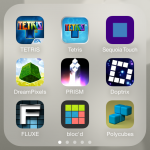I was musing on game design this morning, and came to a conclusion that I already knew both intellectually and intuitively, but one that I’m not sure I’ve articulated to myself previously: Game design is a creative endeavor. (With all the subjectivity and painful process woes that plague all creative endeavors.)
I’ve always just made games that I myself wanted to play, avoiding the entire camp of game design that suggests your players should be influencing your design. That may sound like an arrogant position to take, but at first it was borne more out of laziness and ignorance than anything else. Until I attended my first GDC in 2012, I didn’t even really realize there were people whose job was game design, and I certainly didn’t realize there were books written on it or — more importantly — people thinking about it academically. It was that revelation, more than any other, that has kept me going back to GDC; I find immense value in immersing myself in game design topics opinions and thinking for a week, not to mention all the networking opportunities.
But anyway, aren’t I also a player? In my opinion, I’m a player whose wants and desires are seriously under-served. (That means my games are probably for a small segment of the market, and I’ve made peace with that. I’m not looking for commercial success… if it finds me, awesome.) I’m not going to cave to the pressure to make games for someone else. Because essentially I feel like that’s compromise. And I think compromise kills art. My vision is no more important than anyone else’s, but it’s also just as important as everyone else’s. And hey, I’m the one making it.
So is this all one big excuse for not accepting constructive feedback? Partly, yes. These thoughts all come in the wake of showing off a new (-ish) board game last night at a local game designer meetup. I haven’t talked about this game publicly before, and this whiny blog post is probably not the place to start, but it was not received well. (In spite of many — at least 10 — fairly successful playtests previously.) Mostly, the feedback last night consisted of ways to change the game entirely, ways to take it in some other direction. Essentially, the playtesters (game designers, but for one) didn’t enjoy the game, and spent a good fifteen minutes after their play trying to brainstorm ways to “fix” the design. Almost all the player suggestions last night involved tearing up the design and making something new out of the pieces. This is something I’ve already done with this particular design at least three, maybe four times so far, and I’m actually very happy with where it’s at right now, so that option is not really on the table.
It’s hard not to take this kind of feedback personally. (Made more difficult by at least one of the designers in question having a lot of problems keeping his feedback constructive.) The whole experience really threw me for a loop, and I spent this morning struggling against an impulse to just put the game away and not think about it for a while.
Perhaps I can salvage this piece by adding a few bullet points about giving constructive game design feedback.
- Be thoughtful — Generally speaking, think before you speak. As best you can, it’s a good idea to form complete thoughts before you speak them. If you’re offering up specific “fixes” for a perceived issue, make sure you articulate that issue before you offer up your solutions. Think about why something is a problem before you say it’s a problem. General “impressions” are generally not that useful, better to back them up with a “why” or a “how”.
- Be courteous — Nothing invalidates your feedback quicker (or makes it harder to hear) than an insulting statement. Make sure your feedback is about the game, and cannot be construed as a criticism of the designer. In general, if it’s not nice, try hard to think of a way to say it nicer.
- Context is everything — Ideally the game designer has asked for specific feedback points, but even if not, it’s probably worth asking some probing questions before getting into a torrent of specific criticisms. There are several “levels” at which you can talk about any game. Is the designer looking for feedback about the overall systems used in the game, or are they looking for feedback about specific components or balance issues?
- Be specific — “I did not like this.” is not, by itself, useful feedback. Generally speaking, the more detailed you can be about why you didn’t (or did!) like something the better. If the designer was paying attention, they probably already know whether you were enjoying the experience.
- Stay on topic — I’ve found that “after playtest discussion” can easily veer into a speculative realm of what-ifs and imaginary games that could exist. This is especially true with game designers. Try not to be the one leading the discussion away from the current game.






